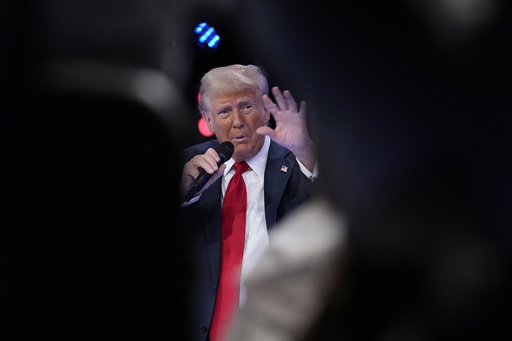With just three weeks remaining in the presidential race, Democrat Kamala Harris is concentrating her efforts on solidifying support in key states known as the “blue wall,” namely Pennsylvania, Michigan, and Wisconsin. This strategy aims to mitigate a repeat of the 2016 electoral disappointments faced by Hillary Clinton in these crucial areas.
Harris’s daily itinerary showcases the Democratic nominee’s prioritization of her most viable route to clinch victory against her Republican opponent, Donald Trump. According to her campaign, she remains committed to engaging voters in Sun Belt states like North Carolina, Georgia, Arizona, and Nevada, even if her focus remains predominantly on the northern states.
On Monday, the vice president made an appearance at a hockey rink in Erie, Pennsylvania, where she criticized Trump as “unhinged.” The following day, she toured an art gallery in Detroit alongside actors Don Cheadle, Delroy Lindo, and Cornelius Smith Jr., and participated in a radio town hall hosted by Charlamagne tha God.
Harris continued her campaign efforts on Wednesday in Pennsylvania, where she emphasized her dedication to the Constitution, standing not far from the Delaware River, a historic site where George Washington and his troops crossed during a significant moment in the Revolutionary War.
Her busy schedule continues unabated throughout the week. On Thursday, she will return to Milwaukee as she seeks support from younger voters. The day includes attending a business class at the University of Wisconsin-Milwaukee followed by a rally for students at the University of Wisconsin-La Crosse, concluding with a gathering in Green Bay.
On Friday, Harris is set to hold meet-and-greet sessions in Michigan, with a campaign stop planned in Detroit on Saturday.
In other news, early in-person voting has commenced in North Carolina, a critical electoral battleground still recuperating from the aftermath of Hurricane Helene. Many potential voters in western regions remain without electricity and access to clean water due to the extensive flooding the storm caused three weeks prior.
According to Karen Brinson Bell, the State Board of Elections Executive Director, more than 400 polling locations across all 100 counties were prepared to open for the 17-day early voting period. Impressively, only four of the 80 ballot sites in the 25 western counties severely affected by the storm remained closed.
Hurricane Helene tragically claimed at least 246 lives, with just over half of those fatalities occurring in North Carolina, marking it as the deadliest hurricane to strike the U.S. mainland since Hurricane Katrina in 2005. Early in-person voting extends until November 2, and this method has proven popular among North Carolinians, with over 3.6 million ballots—approximately 65% of all ballots cast—counted in the 2020 general election. In the previous election cycle in 2016, around 62% of voters opted for early voting.
Absentee voting commenced earlier this month, with more than 67,000 completed ballots submitted thus far. Election officials have allowed those displaced by the hurricane to use any early voting site for submitting their absentee ballots.
On Thursday, Democratic vice presidential nominee Tim Walz was slated to campaign in Winston-Salem and Durham, where he will be joined by former President Bill Clinton. In addition, South Dakota Governor Kristi Noem, U.S. Senator Cindy Hyde-Smith of Mississippi, and Republican National Committee Chairman Michael Whatley were expected to participate in the “Team Trump Bus Tour,” which is set to resume in Rutherford County, an area severely impacted by the hurricane.
President Joe Biden, on his way to Germany, responded to recent derogatory comments made by Trump on social media regarding Kamala Harris, referring to her as “the worst vice president in history.” Biden, walking towards Marine One, urged reporters not to give weight to Trump’s statements, insisting, “You don’t listen to Donald Trump, do ya?”
During a campaign event earlier in the week, Biden labeled Trump as a “loser” and emphasized that if Harris were to be elected, she would forge her own path as president, bringing a new and fresh perspective to the nation’s challenges—contrasting this with Trump’s outdated and dishonest approach.
